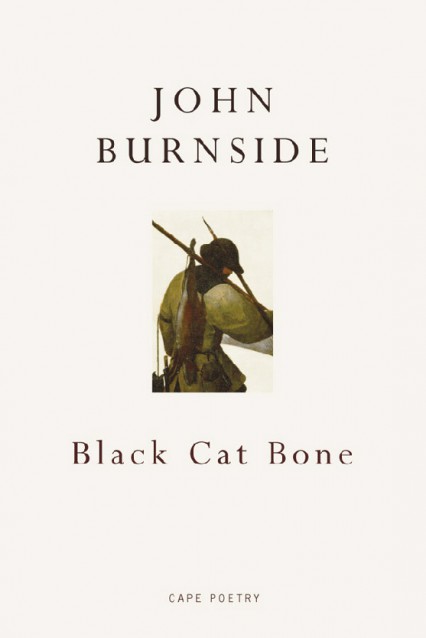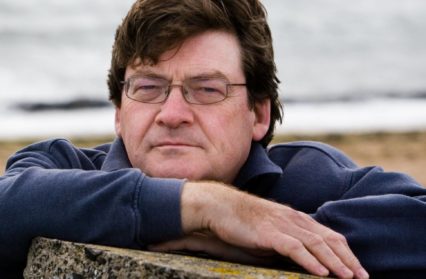Carl Griffin casts a critical eye over the new poetry collection Black Cat Bone by John Burnside, published by Jonathan Cape.

by John Burnside
80 pages, Jonathan Cape, £10.00
Unless you are new to the poetry of John Burnside, you might already sense the mediation between nature and human nature, the supernatural and the nature of the supernatural, but the powers-that-be have given this collection the thumbs up; this book, his twelfth, is only one of two to have won both the Forward and T.S. Eliot prizes (the other being November, by Sean O’Brien). Though previous collections have arguably been more deserving of this honour, Black Cat Bone is striking from the outset. Split into sections, it kicks-off with a stand-alone poem, the only long poem in the book. This is where Burnside excels. ‘The Fair Chase’ centres on a hunt, where the narrator becomes separated from his peers and chases his own prey. Weighted with animals, snow, descriptions of woodland and a nod to the gods, it is the only poem in which Burnside, also a novelist and Professor of Creative Writing, borders on the prosaic. The hunted creature is never identified; a sign, the sceptic might say, of the vagueness found later in the book.
‘Everafter’, the first section proper, includes just over half-
a pintailed duck
is calling to itself
across a lake,
the answer it receives
no more or less remote than we become
to one another,
It could be said though that he doesn’t seem to look in many other places. The section, indeed the entire collection, is overrun with animals. He looks to them to find what it is to be human, to live beyond ourselves. His observations bear fruit when he cynically concludes:
mapped
then set aside, till we admit
that love divulged is barely love at all:
only the slow decay of a second skin
concocted from the tinnitus of longing.
But God is certainly on Burnside’s mind, or the presence of God, or gods. ‘The Fair Chase’ bears a Psalm under its title and ‘Everafter’ acknowledges Matthew and Judges. The next section, ‘Black Cat Bone’, carries on the theme with an opener, ‘Nativity’, which compares his birth, or an average, if gritty, birth, to the birth of Christ; ‘No gifts for me, no angel in the rafters’. You can’t escape the claustrophobic contemplation of another world, a world comparable here to an aquarium where the dead and the missing look back to Burnside and remind him not to forget them, but there is rarely a time when he sinks his teeth in deep enough, never getting his fillings dirty, whereas in previous books cross-
In the ‘Black Cat Bone’ section, named after a powerful hoodoo lucky charm, thought to ensure its owner invisibility, sexual power and even rebirth after death, the focus is more on the last moments of a person’s life, at least the life we see or might guess at, always outdoors, often in a wood or field and with an animal thrown in for good measure. In ‘Death Room Blues’, irrelevant wolves creep through overly-
Small wonder that I overcame my fear
of sweetness, when the only white I knew
was first snow at the margins of the world,
Burnside’s reliance on nature to get his point across, maybe even to come up with one in the first place, can become tedious, but when he flexes his muscles and the press is spot-
and any chore is sweeter, now,
than scripture, where the hand that smoothes away
each local asterisk of stripped desire
can seem so much like something I once lost
I’m half convinced that childhood never happened.
Snow falls heavily in this section and then in the finale, ‘Faith’, where faith is a fragile thing and can come out violently when people die or go missing. The snow can be tarpaulin hiding the curses of the world or an additional obstacle we have to overcome. And even what we find in the snow, as in ‘Hearsay’, isn’t static:
a silver bracelet
falling for days
through an inch and a half
of ice.
And where there’s a Burnside poem, there’s an animal. Even when it is snowing they don’t get a day off. In ‘Insomnia in Southern Illinois’, over the snow, first ‘a barred owl flits’ then later ‘the tracks of the mule deer come and go’. Themes spread throughout the book unite, as they did at the beginning in ‘The Fair Chase’, in the last poem, ‘From the Chinese’, the snow, labelled here as White Christmas, turning to slush, the gods returning to land and, finally, a hare in flight which leaves him ‘dumbstruck, ready to be persuaded’.
Burnside will dig again; you can sense, after reading, that his curiosity has yet to be exhausted. As in ‘A Game of Marbles’, he is desperately trying to dig up what he knows is there, what he himself buried to keep safe. As in ‘The Fair Chase’, he is still hunting, on the prowl, never reaching a conclusion but, with each new collection, crossing out another mile.
You might also like…
Carla Manfredino reviews Psalmody by Maria Apichella, a thoughtful and refreshing collection illustrating the often trivial aspects of love and religion.
Carl Griffin is a frequent contributor to Wales Arts Review.











